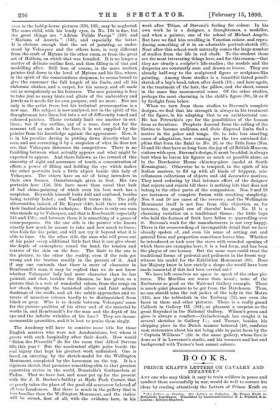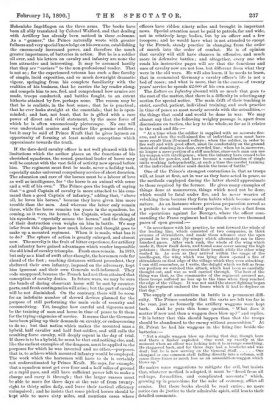BOOKS.
PRINCE KRAFT'S LETTERS ON CAVALRY AND. INFANTRY.* ANY one who may think it easy to train soldiers in peace and conduct them successfully in war, would do well to correct his
ideas by reading attentively the Letters of Prince Kraft zu
• (1.) Letters on Cavalry. (2.) Letters on Infantry. By Prince Kraft zit Hohenlohe Ingelfingen. Translated by Lieutenant-Colonel N. L. Watford, RA.. London : Edward Stanford.
Hohenlohe Ingelfingen on the three arms. The books have been all ably translated by Colonel Walford, and that dealing with Artillery has already been noticed in these .columns. As a "gunner," the Prince naturally wrote with greater fullness and very special knowledge on his own arm, establishing the enormously increased power, and therefore the much greater importance, of batteries in action. But he is a soldier all over, and his letters on cavalry and infantry are none the less attractive and interesting. It may be assumed hastily that they are "caviare" to the non-professional reader. That is not so ; for the experienced veteran has such a fine faculty of simple, lucid exposition, and so much downright dramatic vigour, springing from his complete familiarity with the realities of his business, that he carries the lay reader along, and compels him to see, feel, and comprehend how armies are made, troops conducted, and battles fought, to an extent hitherto attained by few, perhaps none. The reason may be that he is realistic, in the best sense ; that he is practical; that he ever looks straight at the essentials ; that he is open- minded ; and last, not least, that he is gifted with a rare power of direct and vivid statement, by the mere force of which he is often unconsciously picturesque. No one will ever understand armies and warfare like genuine soldiers ; but it may be said of Prince Kraft that he gives laymen an opportunity of forming at least modest conceptions which approximate towards the truth.
If the dare-devil cavalry officer is not well pleased with the limitations which the author places on the functions of his cherished squadrons, the sound, practical leader of horse may well be content with the vast field of activity now spread before him. The regiment must first be made, never a holiday task, especially under universal compulsory service of short duration. The education and care of the horses must be a labour of love as well as intelligence, for "the horse is an animal with sense and a will of his own." The Prince goes the length of saying that "a good Captain of cavalry is more attached to his com- mand than a good Captain of infantry," adding that, "above all, he loves his horses," because they have given him more trouble than the men. And whereas the latter only remain three, while the horse remains ten years in the squadron, be- coming, as it were, its kernel, the Captain, when speaking of his squadron, "especially means the horses," and the thought of their destruction even weighs on him in battle. We may infer from this glimpse how much labour and thought goes to make up a mounted regiment. When it is made, what has it to do P The sphere of action is greatly enlarged, and almost new. The novelty is the fruit of bitter experience, for artillery and infantry have gained advantages which render impossible the old kind of cavalry triumphs. Fresh ones remain. In 1870, but only as a kind of swift after-thought, the horsemen rode far ahead of the foot ; reaching distances without precedent, they sheltered their own infantry, imposed on the adversary, kept him ignorant and their own Generals well-informed. They rode unopposed, because the French had not then attained that conception of cavalry duties. In future wars, we may be sure the bands of daring observant horse will be met by counter- parts, and fresh contingencies will arise ; but the part of cavalry will be not diminished. On the contrary, there will be room for an indefinite number of shrewd devices planned for the purpose of still performing the main ends of security and reconnoitring. Yet, imagine how careful and rigorous must be the training of man and horse in time of peace to fit them for the trying exigencies of service. It seems that the Germans have been piling up their demands on cavalry, or endeavouring to do so ; but that nation which makes the mounted man a hybrid, half cavalier and half foot-soldier, and still calls the resulting force cavalry, will deeply repent in the day of trial. If there is to be a hybrid, he must be that and nothing else, and, like the earliest examples of the dragoon, must be applied to the purposes for which he was invented and no other,—purposes, that is, to achieve which mounted infantry would be employed. The work which the horsemen will have to do is certainly not underestimated by Prince Kraft. He says, for example, that a squadron must get over four and a half miles of ground at a rapid pace, and still have sufficient power left to make a charge and carry it through ; that the larger masses must be able to move for three days at the rate of from twenty- eight to thirty miles daily, and leave their tactical efficiency unimpaired ; and he insists that some picked horses should be kept able to move sixty miles, and mentions cases where
officers have ridden ninety miles and brought in important news. Special attention must be paid to patrols, far and wide, not in relatively large bodies, but by an officer and a few troopers ; and he would have what is not attended to except by the French, steady practice in changing from the order of march into the order of combat. He is of opinion that cavalry will still have chances in offensive, and much more in defensive battles ; and altogether, every one who reads his instructive pages will see that the functions and uses of cavalry now are not less, bat different from what they were in the old wars. He will also learn, if he needs to learn, that in economical Germany a cavalry officer's life is not a bed of roses ; and what is more, that in the course of twenty years' service he spends 22,000 of his own money.
The Letters on Infantry abound with so much that goes to the root of the matter, that there is a difficulty in selecting any section for special notice. The main drift of their teaching is strict, careful, patient, individual training, and such practice
in time of peace as most nearly accords with the actualities,—
the things that could and would be done in war. We may almost say that the following weighty passage is, apart from discussions on tactics, the key to the whole, so far as it relates to the rank and file :—
" At a time when the soldier is supplied with an accurate fire- arm, and when the well-aimed fire of individual men must have more result than ill-aimed volleys ; when the soldier, in order to fire well and with good effect, must lie comfortably on the ground instead of standing in a close, crowded line ; when he is, moreover, no longer a mere portion of a stiff machine, since each man can use his weapon with intelligence ; when the infantry have ceased to be only food for powder, and have become a combination of single units working independently, at such a time the careful training of the individual soldier must decide the issue of battle."
One of the Prince's strongest contentions is, that as troops
will, at least at first, act in war as they have acted in peace, so the methods employed during the latter should approximate to those required by the former. He gives many examples of things done at manceuvres, things which need not be done, which would be fatal under fire, and he never wearies of rebuking them because they form habits which become second nature. As an instance where previous preparation served as a prelude to actual successful practice, he cites a fact from the operations against Le Bourget, where the officer com- manding the Franz regiment had to attack over two thousand paces of open ground :—
" In accordance with his practice, he sent forward the whole of the leading line, which consisted of two companies, in thick swarms of skirmishers, and made them advance over the open ground in two parts (by wings) which alternately ran in three hundred paces. After each rush, the whole of the wing which made it, threw itself down, and found some cover among the high potatoes ; there they recovered their breath while the other wing rushed in. As soon as they arrived within the range of the needle-gun, the wing which was lying down opened a fire of skirmishers on that edge of the village which they were attacking. I can still remember, as I write, the delight which we felt as from our position we watched this attack, which had been so carefully thought out, and was so well carried through. The best of the thing was that, RS the commander of the regiment assured me, these troops suffered no loss up to the time when they reached the edge of the village. It was not until the street-fighting began that the regiment endured the losses which it had to deplore on that day."
The supply of ammunition in battle is a permanent diffi- culty. The Prince contends that the carts are left too far in the rear, just as formerly the artillery waggons were kept back. And he puts this home question, "What does it
matter if now and then a waggon does blow up ?" and replies, "It is better that this should happen than that the troops should be abandoned to the enemy without ammunition." At St. Privat he had his waggons in the firing line beside the batteries :—
" Not a single waggon blew up during that day, though here and there a limber exploded. One went up exactly at the moment when an officer was looking into it to arrange something. He staggered back, and for three days had, a headache and was
deaf ; but he is now serving on the General Staff One shrapnel or one common shell falling directly into a column, will cause three times as much loss as an ammunition-waggon which blows up."
He makes some suggestions to mitigate the evil, but insists that, whatever method is adopted, it must be "freed from all red-tape, formalities, and complicated accounts" which, growing up in peace-time, for the sake of economy, afflict all armies. But these books should be read entire ; no mere notice can do justice to their admirable spirit, still less to their detailed comments.



































 Previous page
Previous page